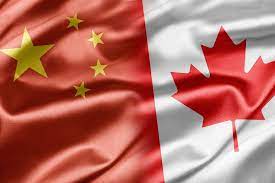Title: The Rising Tide of Tariffs: What Canada and China’s Trade War Means for You

As of March 20, 2025, China is set to impose significant tariffs on a range of Canadian goods, radically reshaping trade dynamics between these two nations. Aquatic products and pork will now face a hefty 25% tariff, while items like rapeseed oil (commonly known as canola), peas, and oil cakes will be slapped with a staggering 100% tax. Additionally, imported electric vehicles from Canada will be subject to a 100% tariff, while Canadian aluminum and steel will incur a 25% tariff. So what does this mean for Canada, its farmers, and the everyday consumer? Let’s dive deeper.
Canada’s Response: Standing Firm
In a statement that reflects a defiant stance, the Canadian government responded unequivocally: “Canada does not accept the premise of China’s investigation, nor its findings.” This response addresses the underlying issues of China’s “non-market policies,” which have been said to distort production costs and market dynamics. Canada remains committed to constructive dialogue with Chinese officials to resolve trade disputes.
Tariff Escalations: A Brief History
This latest development is not an isolated incident. Back in October 2024, Canada took a stand by implementing a 100% tariff on Chinese electric vehicles. This action followed a similar trend where both the United States and the European Union imposed tariffs on Chinese goods, uniting Western nations against what they perceive as an unfair trade landscape characterized by cheap labor and government subsidies in China.
The Export Landscape: What’s at Stake?
In 2023, Canadian exports to China totaled a remarkable $31.1 billion, with a notable increase of over 6% in the last five years. Gold, petroleum, and rapeseed are among Canada’s principal exports to China, while Canada imports vehicles, computers, and broadcasting equipment from China. With rapeseed being Canada’s second-largest crop by acreage, the stakes are high—especially since China is the largest consumer of Canadian rapeseed.
The Canola Council of Canada estimates that last year, canola seed oil and meal exports reached approximately C$4.9 billion, supporting around 40,000 Canadian farmers who generate C$43.7 billion annually. However, the looming tariffs create an air of uncertainty, as emphasized by Rick White, the CCGA President & CEO: “Canadian canola farmers are facing an unprecedented situation of trade uncertainty from our two largest export markets only weeks before planting begins.”
Geopolitical Tensions: A Broader Context
The trade friction between Canada and China isn’t merely economic; it’s deeply rooted in geopolitical tensions. Recently, China expressed strong disapproval of Canada’s actions regarding its One China policy, raising concerns about sovereignty and regional stability. It’s a complex interplay that could have far-reaching consequences.

The EV Conundrum: A Market Divided
The electric vehicle sector is particularly contentious. China has launched an anti-discrimination investigation regarding tariffs on its EVs, arguing that these measures violate World Trade Organization (WTO) principles. However, the dominant narrative suggests that Western nations are wary of the fierce competition presented by Chinese technology and manufacturing capabilities, leading to protectionist policies.
Canada portrays its tariffs as a necessary response to “non-market policies” that give China an unfair advantage, igniting a debate about fairness and competition in global trade. Yet, the question arises: where is the public outrage?
The Cost to Consumers and Businesses
Ultimately, it’s everyday consumers and businesses who bear the brunt of these trade wars. The ongoing cycle of tariffs and counter-tariffs leads to increased costs for goods and services, making life just a little bit more expensive for the average Canadian. The tit-for-tat nature of these tariff wars highlights a broader concern: are governments inadvertently harming their own economies in the pursuit of political leverage?
Conclusion: Navigating an Uncertain Future
As the trade war escalates between Canada and China, the future of commerce, especially in agriculture and technology sectors, hangs in the balance. For those in the Extreme Investor Network community, understanding these dynamics is key to making informed investment decisions. Stay tuned as we monitor these developments closely and provide actionable insights to navigate this turbulent trading environment.
At the Extreme Investor Network, we are committed to delivering unique insights that go beyond the basics, connecting you with the information you need to make sound financial decisions in this rapidly evolving economic landscape. Join us as we explore the implications of these tariffs and what they mean for your investments.

